Education is empowering. Though diplomas don’t come with a money-back guarantee for automatic success, higher learning does tend to open doors to more choices in life, fan the flames of financial freedom when applied to a passionate path and, generally, expand horizons. They say knowledge is power, and there doesn’t seem to be a downside to knowing more. Rodeo cowboys are diverse when it comes to academic achievement. Some stuck it out in school. Others flew the college coop the first chance they felt like they had a legit chance to win at the world-class level. By no means does a successful career require a bachelor’s degree. But there are some fun scholastic success stories among us in the cowboy sport.
Logan Medlin
- Agricultural Economics, 2014
- Eastern New Mexico University
- 4 NFR qualifications
“My mom (Lisa) was a high school teacher, and my dad (Jeff, who heeled at the NFR in 1991 and 1996) felt strongly about me going to college,” said Logan, who won back-to-back National Intercollegiate Rodeo Association team roping titles with Billy Bob Brown in 2013-14. “After I graduated college, they were supportive and all behind what I wanted to do. I didn’t always enjoy college, and you don’t have to go to college to make it or be successful in this world. But I’m glad they made me do it.”
While Medlin may not have craved college when all he could think about was roping for a living, he’s glad he completed the courses.
“There are so many cool experiences that you only get in college, before you hit the real world,” he said. “I made a lot of memories and friends that I’ve stayed in touch with. I have some rental houses in Stephenville that my family has that I tend to, and use some things I learned in school dealing with that, too.”
College rodeo also served as a stepping stone for Medlin on his climb up the roping ranks.
“Truthfully, college rodeo helped get me through college,” said Medlin, who lives in Stephenville with his wife, Breely, and daughter, Kamryn, 1. “It gives you an opportunity to learn how to win and handle your business. I think college is a useful learning curve for a rodeo career. Rodeo can help get college paid for, and you learn things that apply to every aspect of life.”
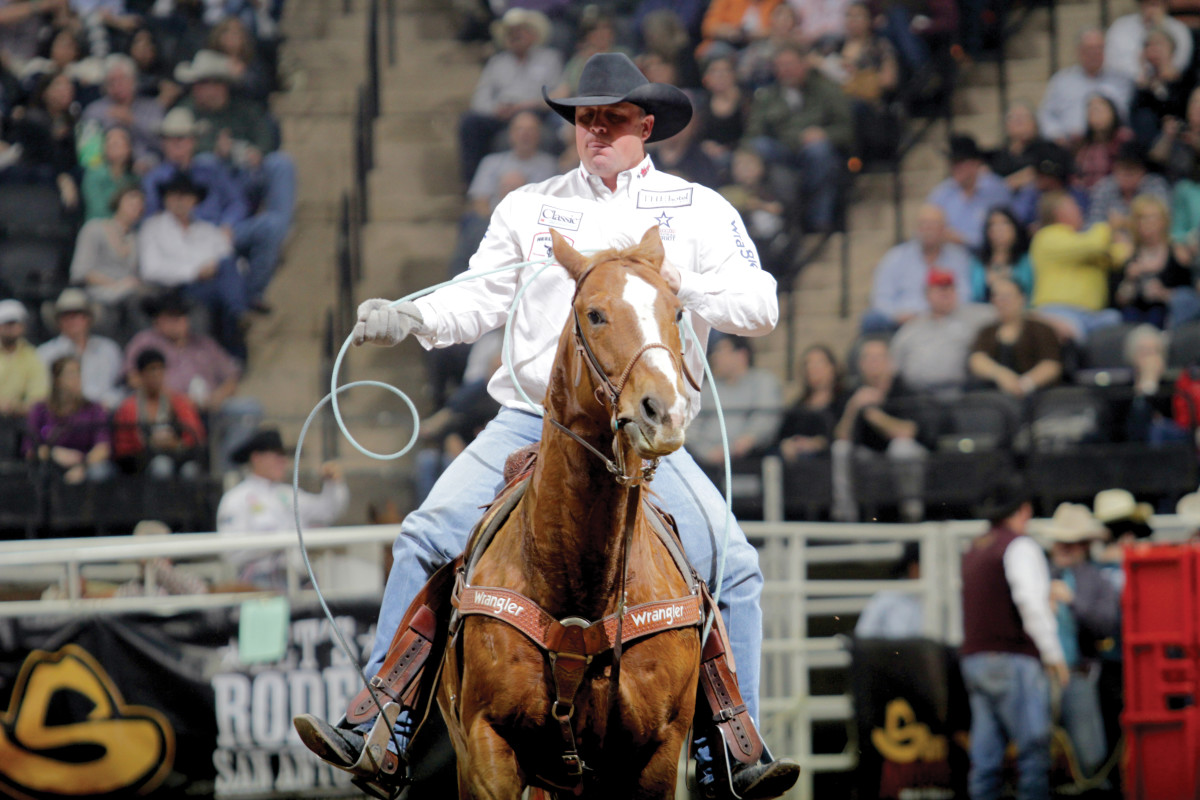
Jhett Johnson
- Psychology, 1994
- Oklahoma Panhandle State University
- 2011 World Champion
“An education is something you have, and it’s kind of like spurs,” said 2011 World Champion Heeler Johnson, who now serves as head rodeo coach at Casper College in his native Cowboy State of Wyoming. “If you don’t need your degree for whatever you decide to do, then don’t use it. But if you need it and don’t have it, you’re in trouble. These days, a lot of kids have a chance to get excellent scholarships and get most of their schooling paid for. If you can get damn near a free education, why not?”
Johnson is a sixth-generation Wyoming rancher. Though his future might seem secure at home on the range, he’s loving the chance to give back to rodeo’s next generation. He also hopes to impact their future plans by shining a light on some rodeo truths.
READ: Brotherly Bonds: Navigating Sibling Team Roping Partnerships Ain’t for the Faint
“Rodeo’s not at the level of other professional sports, and maybe it won’t ever be,” Johnson said. “I mean, Trevor (Brazile) made a real living rodeoing. But he’s our Tiger Woods. Guys who are really good still need an income when they’re done. That’s what I tell kids coming in, especially good guys planning on being NFR cowboys. They just think everything will be paid for, and they’ll pay everything off and retire in Arizona. Rodeo went really well for me, and I still needed a job when I slowed down. And a lot of the better jobs require a degree.”
Johnson sees no downside to a college education. Even with his highly distinguished rodeo resume, he leaned on his college diploma to land his dream job. As he puts it, “Having a degree was what allowed me to be a college rodeo coach.” Johnson now looks back on his time in college as a chance to hone his cowboy craft and pursue a major that helped shape his career inside the arena and out.
“How our minds work effects everything we see and how we see it,” Johnson said. “I’ve used what I learned in college every day of my adult life, as a team roper and now as a coach. Winning is such a mental thing, and I was a piss-poor loser. But by understanding psychology, I could shake it off by the next morning and be ready to go again.”
Casper College Coach Johnson and his elementary school teacher wife, Jenny, have encouraged their three sons, Kellan, Carson and Kress, to get a good education. Those eldest two Johnson boys claimed the 2021 NIRA team roping title roping together at the College National Finals Rodeo in June, representing Casper College.
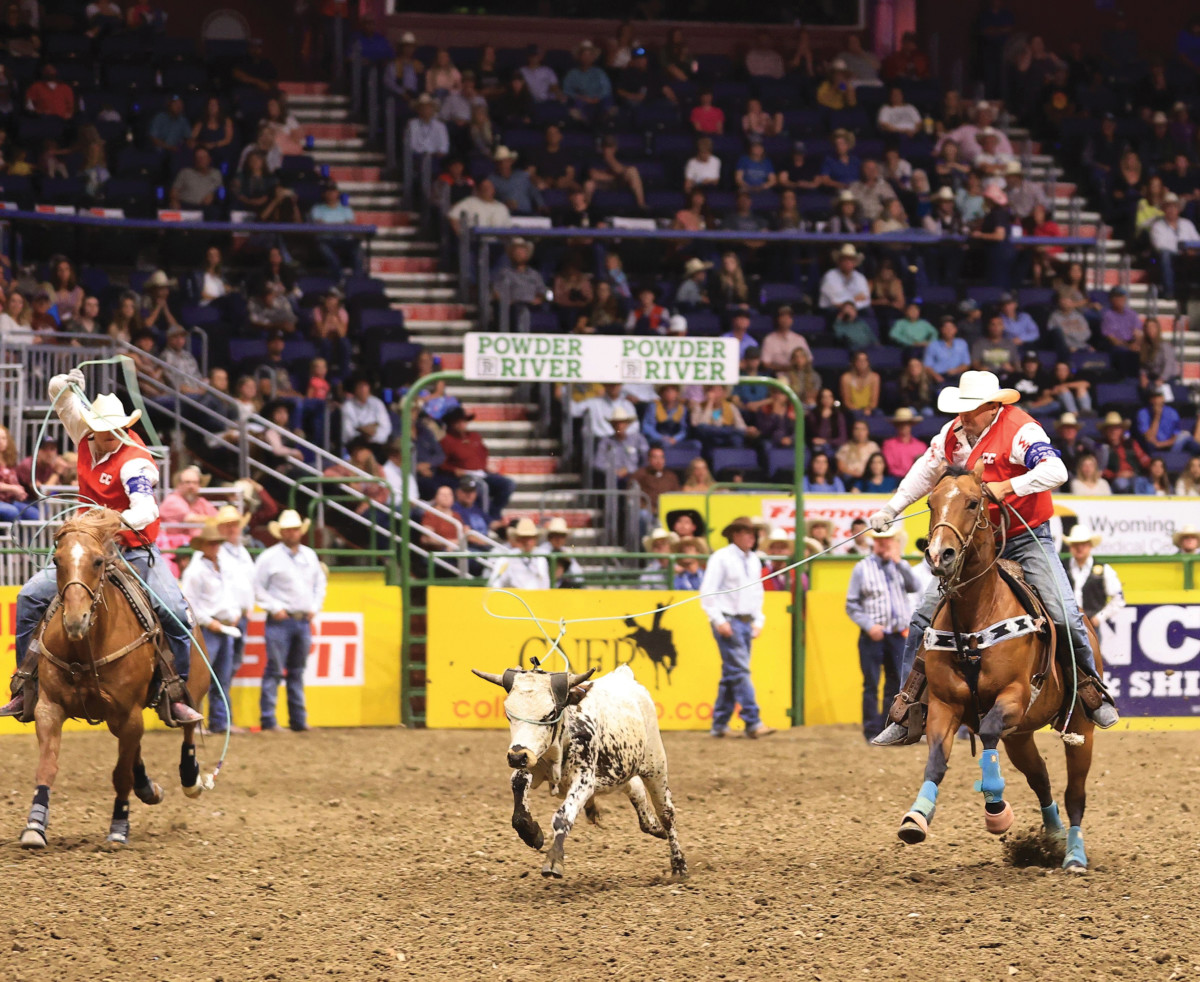
Kellan Johnson
- Psychology, University of Wyoming
- 2x CNFR champion
“College rodeo can also be a good motivation to stick with school,” said Kellan Johnson. “College rodeo helped keep me on track and stay in school. When I was young, I got to see my dad and his mental game in the arena. I got to see the way he understands psychology, because he went and visited mental institutions and understands the brain.
READ: How Kellan Johnson Won His Second CNFR Team Roping Title
“When you think about big-time athletes in any sport—basketball players hitting the game-winning shot, field-goal kickers making the game-winner in football or baseball players hitting a walk-off homerun—they have the ability to slow their brains down and still have a clear thought process when they’re nervous. It’s helped me a lot in pressure situations to keep it simple, stick to the basics and slow it down.”
Johnson considers his college years to be time well spent.
“Going to college lets you mature and grow up,” he said. “You don’t realize it until you’re away from home, but you learn to take care of business. You have to go buy groceries when you’re hungry, go buy hay for your horses, and take care of your trucks and trailers. You make friends, and get a feel for what else is out there in the world.”
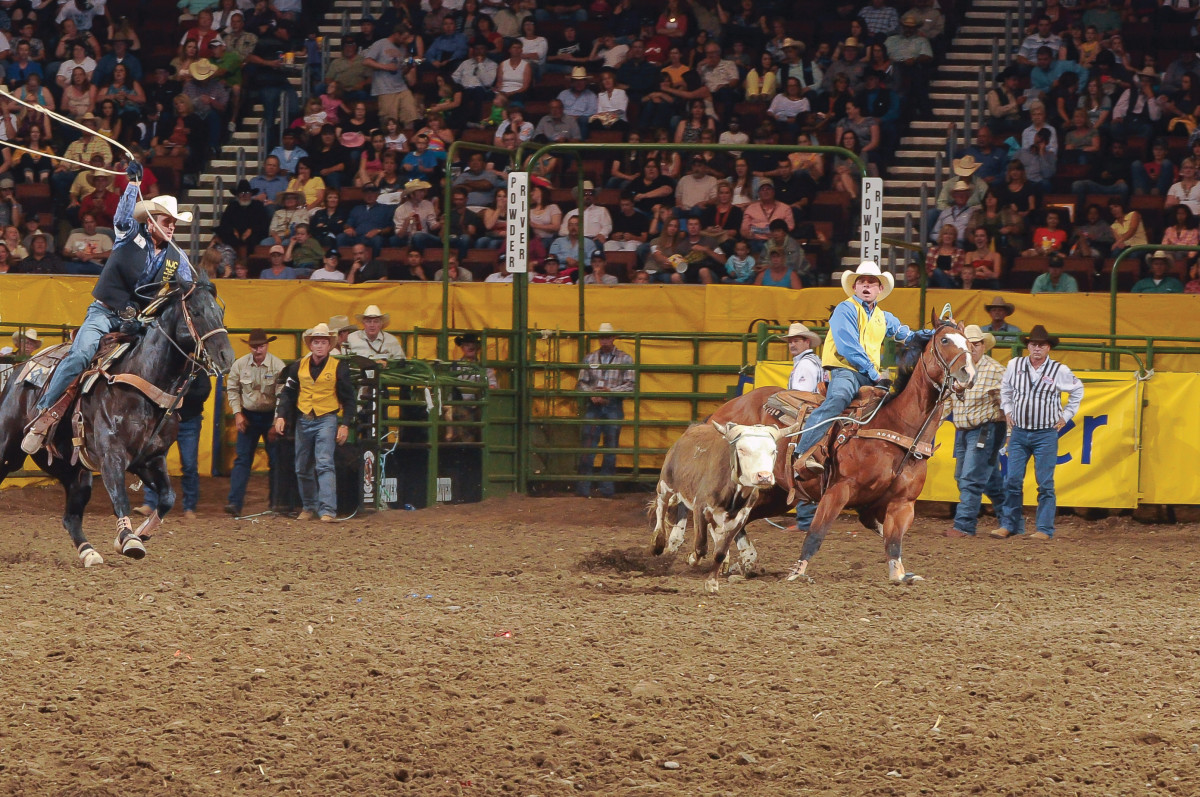
Shay Carroll
- Business Marketing, 2014
- Tarleton State University
- 3 NFR qualifications
For NFR heeler Shay Carroll, college felt like the right thing to do. Looking back, it helped him get where he is as a professional team roper today.
“The fact is when you get out of high school and really in college, too, you’re always competing against your same age group,” he said. “What college allowed me to do was bridge the gap between high school and professional rodeo. If I’d gone straight to the professional level, I would’ve gotten discouraged and beaten down.
“The first college I went to (Northeastern Junior College in Sterling, Colorado; Carroll won the 2012 NIRA team roping title heeling for Tyler Schnaufer while attending NJC) I got to rope 30–40 steers a day. Then, I went to Tarleton in Stephenville, where I went to class between 8–12 and got to rope 80 steers a day between my house, my friends’ places and the school.
“I appreciate my coaches and those colleges for helping me bridge the gap while getting an education, and without going into debt. I couldn’t have afforded to keep 40 steers and just sit there and practice for four years, so I’m grateful to the colleges for providing that. I picked business marketing, because I thought it would help my roping, and the sponsor side of our business. I learned a lot.”
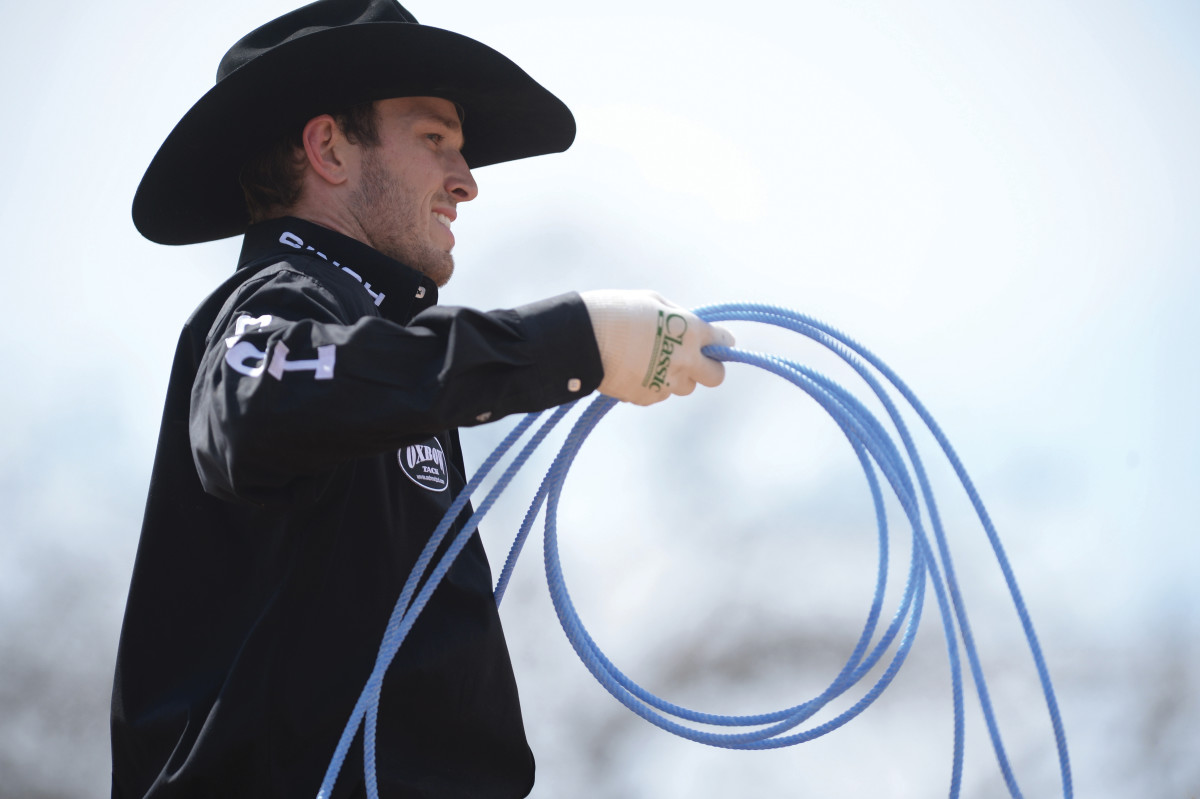
Drew Horner
- Business/Corporate Communications, 2016
- Dallas Baptist University
BFI champ and NFR header Drew Horner stepped away from professional rodeo to become a successful businessman, and always knew a degree would help give him more leverage in life after rodeo. He went about it in a less traditional way, yet always knew there was a bounty to be had by hitting the books.
“I got my degree part-time online while I was rodeoing full time,” he said. “I intentionally took it part time, so I could still go compete against the best at a young age. I wanted to be an elite professional cowboy and also get a college degree, because I wanted options. There are benefits to going to college and getting the in-person experience, but you don’t have to do it that way.
“When I was, like, 17 or so, I wrote out a plan to turn pro and make the Finals. My goals were to win a major rodeo and make the NFR, then re-evaluate the next phase of life. After making the Finals in 2013, winning The Feist in 2014 and the Dodge National Circuit Finals Rodeo in 2015 (all with Buddy Hawkins), I had done all I wanted to do in rodeo. At that point, it was about deciding to either finish college and transition to something else or make rodeo a career. I wanted a degree to be able to make a choice. A college degree gives you flexibility and more options.
“I saw legends of our sport—Al Bach, Jake Barnes, Speed Williams, Clay Cooper—that I looked up to that all said to go to college and give yourself choices. I took their advice. It’s not like you have to get straight A’s or go to an Ivy League school. My goal was to graduate and give myself freedom for success pursuing any path. Education gives you more options, even in the sport of rodeo.”
READ: 13 Things Breakaway Ropers Need to Know About College Rodeo
Horner was called to pursue a path in business, though he still has a great love for the sport of rodeo. Sticking it out in school doesn’t always sound glamorous to young guns who think they’re rodeo ready. But very rarely does anyone ever regret a hard-earned diploma hitting his or her hands. Outside the classroom, college gives young people a chance to make friends and gain skills that will come in handy whenever “life after rodeo” comes. And history says there are very few real rodeo rock stars who ride off into the sunset rich and with no need to work or retirement worries.
“I knew there was a high-percentage chance I wouldn’t rodeo forever, so my degree opened up other avenues,” Horner said. “I started a third-party logistics company called Deliverzen, that specializes in managing, storing and shipping inventory around the world for clients such as Amazon, Wal-Mart, Target and other major retailers.
“My degree in communications with some business is a practical degree that I’ve used a lot over the years. But a degree doesn’t have to be an exact degree. For most people, I recommend something as general and widely applicable as possible. When you graduate, it just shows you can get through it and will make a strong candidate to hire in your field of choice.”
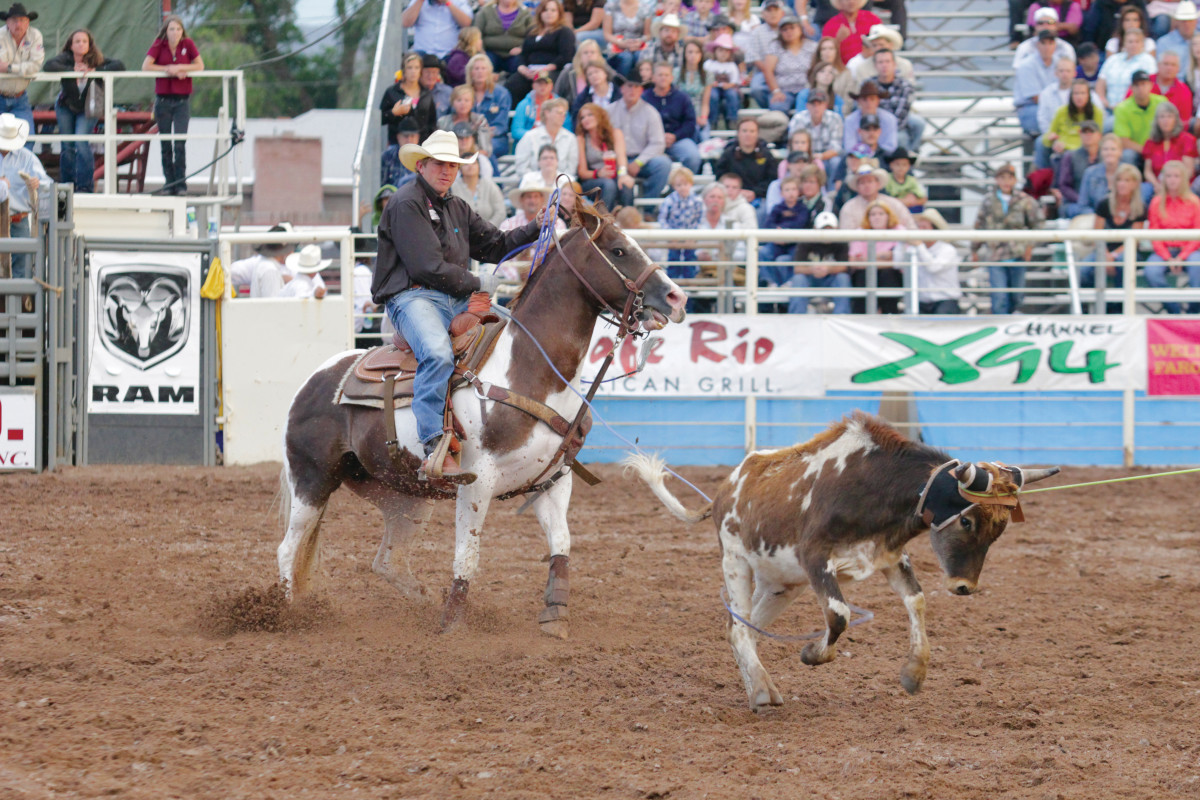
Cole Davison
- Business, 2013
- Sam Houston State University
- 2 NFR qualifications
NFR heeler Cole Davison got great self-satisfaction from completing his degree.
“The biggest thing about getting a degree is the sheer accomplishment of doing it,” he said. “It’s a gratifying accomplishment. I don’t think you have to have a degree to be successful—some of the most successful businessmen I’m around never went to college, and some have PhDs—but it’s a time in your life that you never get back. The whole experience teaches you how to manage life and run a business. I’d go to class, and then was always practicing or roping at rodeos.
“I wish I would’ve hung out a little more and met more people. The networking you get in college takes you a long way in life. The biggest thing I learned in college was how to manage my time. It takes a lot of time to go to college, and the after-hours work you have to put in when you want to do something else takes some management. Lessons like that stick with you for life.”
—TRJ—








